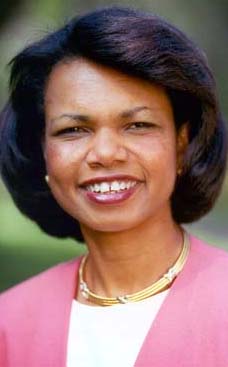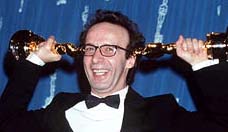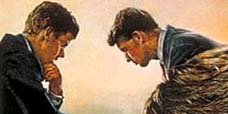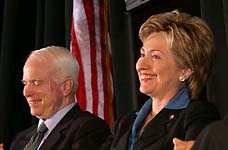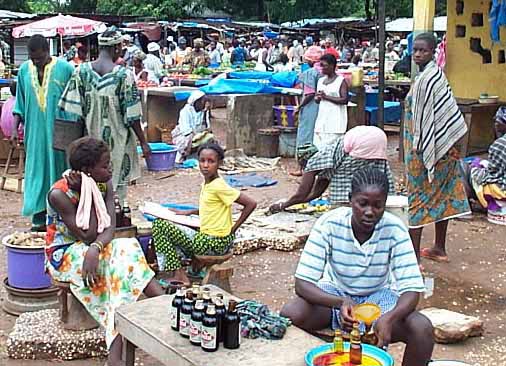
"In Burkina Faso democracy may indeed be the new wave; however, it is a rather authoritarian democracy. When an article appeared in a local newspaper suggesting that President Compaor fed arrested political opponents to the lions roaming his residential grounds, the president didn't throw the journalist into jail just like that. That would be authoritarian. Comparore sued the journalist first, making sure that the courts would then legally chuck the reporter into prison. That's authoritarian democracy."
Niger RPCV William F. S. Miles writes: Letter from Ouagadougou
Letter from Ouagadougou
Jan 1, 2006
Antioch Review
[Excerpt]
"New Yorkers have everything, so nothing fascinates them."-
Tepilit Ole Saitoti, The Worlds of a Maasai Warrior.
Poring over the world atlas as boys, my brothers and I had chosen Ouagadougou, Upper Volta, as the weirdest-sounding, most exotic spot imaginable on earth. Although not that distant on the African map from Timbuktu, the usual emblem of the far out, for us Ouagadougou was by far the more intriguing. Perhaps it was the way we pronounced- or, rather, chanted-the mysterious city's name, over and over again: oo-goo-doo-goo-up-pa-vol-ta-oo-goo-doo-goo-up-pa-vol-ta-oo-goo-doo- goo-up-pa-vol-ta.... Such rhythm on our lips evoked drum beats within our hearts.
Not surprisingly, we had the pronunciation all wrong: the first two syllables are actually pronounced as ah, not oo, so that the city's short form and nickname sounds like Wahgah, not Oogoo. How could we know that in Upper Volta (and where, by the way, was Lower Volta?) they spoke French and that, just as the word for "yes" is spelled "oui" and not wee, so does oua make for wahl
Our chanting and mental images were laced with a juvenile condescension toward all things African common to most Americans growing up in the 1950s. Spear-wielding savages and all that. Tarzan's Africa. It took over thirty-five years but I finally corrected those unfortunate childhood images and sounds. For I have now returned from Ouagadougou. Upper Volta, however, exists no more.
Despite publicized meltdowns in Ivory Coast and Congo, democracy is fitfully making an appearance throughout Africa. In countries where military dictators have been the rule, which has generally been the case in French-speaking Africa, multi-party politics and elections are staging a comeback. But the results have been strange. In Benin, a sliver of land on the northwest coast, and on Madagascar, a gigantic island off the southeast coast, after an interlude of civilian leadership voters restored to power the very same general and admiral who ruled their country into the Afro- Marxist ground for close to two decades.
In Gabon and Chad the strong-arm rulers never left at all, going directly from commander to president by way of internationally observed elections. Togo's populace resisted when the son of Africa's longest-serving autocrat stepped into the shoes of his deceased father, but Gnassingb junior may yet fulfil his aspiration to leadership. And that leads us to Ouagadougou, where Biaise Campaor, having come to power through a coup d'tat and assassination of his friend and predecessor, Thomas Sankara, is not just head of state but elected president.
It was Thomas Sankara, the revolutionary soldier, who in the 1980s changed his country's name from Upper Volta to Burkina Faso. Upper Volta, the name given to the dusty, landlocked nation by the French imperialists, was too colonial for the head of the National Revolutionary Council. Burkina Faso, meaning "Land of the Upright Warriors," is more authentic, more African-sounding. Though few of his revolutionary initiatives have endured, the name that Sankara bequeathed his nation has endured, sometimes in abbreviated form, though I never could figure out when it was correct to say just Burkina, and when plain Faso would do.
Despite its ambiguity, the revolutionary motto also lives on: La Patrie ou la Mort, Nous Vaincronsl-"The Nation or Death, We Shall Conquer!"
In Burkina Faso democracy may indeed be the new wave; however, it is a rather authoritarian democracy. When an article appeared in a local newspaper suggesting that President Compaor fed arrested political opponents to the lions roaming his residential grounds, the president didn't throw the journalist into jail just like that. That would be authoritarian. Comparore sued the journalist first, making sure that the courts would then legally chuck the reporter into prison. That's authoritarian democracy.
For international donors a favorite way to promote democracy is to sponsor conferences. With the financial help of the American Embassy, the University of Ouagadougou was therefore organizing a seminar on democratic institutions in Burkina Faso. No expert on Burkina Faso, I was nevertheless invited to show the American academic flag and speak about the U.S. experience with democracy.
But there were a couple of problems. One was quite ironic, given that we were supposed to be marking the progress toward democracy. According to the program, the final conference session was to be devoted to the perspective of Burkina Faso's mayors, the first ones elected in close to three decades. But administrative regulations, well reflecting the hierarchical and centralized nature of African bureaucracy, prohibited the university faculty from directly inviting such government officials to the conference. Such invitations first had to be cleared and forwarded by the appropriate ministry. The invitations were sitting within the ministry dealing with territorial affairs and had not been sent out.
Result: we would never hear the elected mayors' perspectives on the new democracy arising in Burkina Faso.
The second problem was more serious: University of Ouagadougou students were on strike. Worse, their demonstrations were met with force by the military and four of their leaders were arrested. People were apprehensive about coming to the campus. Conference organizers wished to switch the venue to the American Cultural Center, but the government refused: it would be a blank admission that all was not under control in Ouaga. It was hardly an auspicious beginning for a conference on the institutionalization of democracy.
Students were striking for a number of reasons, but their primary complaint dealt with the campus cafeteria. As the authorities resisted the demands the strike grew, until even high school students joined the movement. The Minister for Higher Education, Scientific Research and secondary Schooling went on a media blitz, ridiculing the students for demanding appetizers, un plat de rsistance, and dessert with each meal. "Let us not forget that we are living in Burkina," he remarked in an "interview" that took up much of the evening radio and television newscasts and was broadcast for a couple of days running.
One could indeed ridicule aspects of the students actions. After all, they were not boycotting meals, only classes. It wasn't a hunger strike but a study stoppage. Among their concerns was learning what happened to a student and professor taken into military police custody during the last university unrest, who were never again seen alive.
My antennae went up when I was told the name of the Ouagadougou hotel at which I would be staying. In a landlocked, wind-swept, waterdeficient country, how could even the most elegant establishment in Burkina Faso (which mine was far from being) justify calling itself the Palm Beach hotel? The answer hit me when, early in the morning, I drew the curtains.
Below, to the left, was a family's dirt-brown, open-air courtyard. Women in colorful wraps and headscarves were already starting to prepare food in clay pots on wood fires. Children, shielding their eyes, slowly emerged from mud brick huts with tin roofs to meet the dry, sunbleached day. Beyond my neighbors stretched a vast residential quarter of similarly arranged mud- brown courtyards, separated from each other by walls of reinforced dried dirt. Above the courtyards, above the rising smoke, lazily glided the vultures.
But immediately below me on my right glistened incongruously the chlorinated, blue-green water from a completely filled, full-sized swimming pool. Three hotel employees were servicing the pool, scooping up surface detritus, checking the filter. Five mornings I awoke to that scene, to African workers diligently preparing the pool and rearranging the lounge chairs. But the Palm Beach patrons did not deliver. Not once did I see a single hotel guest in, around, or anywhere near the pool.
And the rationale for the name "Palm Beach"? It was a colorful fresco of swaying palm trees and other imagined seashore scenes. The opening ceremony and panel were formal in ways that clearly bore the stamp of French imperium. When the head of protocol entered the seminar hall and clapped twice, we were expected to rise and ostentatiously shake hands with the very dignitaries whom we had met in closed chambers a few minutes earlier. Stilted speeches were followed by highly theoretical papers delivered la Sorbonne. Close to forty years after independence, mental colonialism is alive and well.





